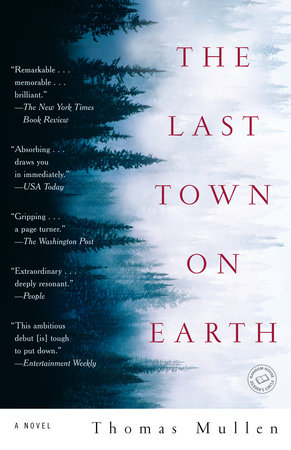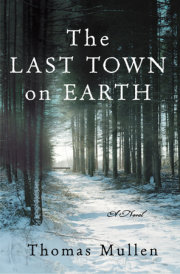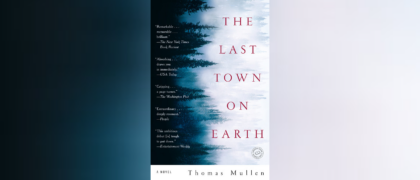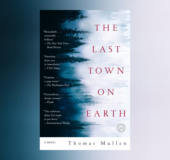Chapter 1
I
The road to Commonwealth was long and forbidding, stretching for miles beyond Timber Falls and leading deep into the evergreen woods, where the trees grew taller still as if trying to reach the sun that teased them with the paucity of its rays. Douglas fir loomed over the rock-strewn road like two warring armies perched on opposing cliffs. Even those travelers who all their lives had been reminded of their insignificance felt particularly humbled by that stretch of road and the preternatural darkness that shadowed it.
Some number of miles into the woods, the road curved to the right and the trees backed off a bit, the brown dirt and occasional stumps evidence that the woods had been cleared out only recently, and only with extreme tenacity. The clearing rose along a gradual incline; at the base of the hill, a tree that had recently been chopped down blocked the road. Into its thick bark a sign was nailed: a warning to travelers who didn’t exist, a silent cry into deaf woods.
A crisp wind picked up atop the bare hill, carrying the combined exhalations of millions of fir and pine. Philip sucked in his breath.
“Cold?” Graham asked.
“I’m fine.”
Graham motioned back to the town. “You need to get yourself a warmer jacket, go ahead.”
“I’ll stay.”
“Suit yourself.” Philip did look cold in his thin jacket and khaki pants—pencil-pusher attire—whereas Graham was clad in his usual blue overalls and a thick wool coat.
“Look like it’s gonna snow to you?” Philip Worthy was sixteen, tall despite the limp that made people think he was shorter, but not as brawny as most of the men in that town of lumberjacks and millworkers.
“It’s not going to snow.”
Graham, twenty-five, was what in many ways Philip aspired to be: strong, quietly wise, the man of his house. While Philip felt he needed to be polite and conversational to ingratiate himself with people, Graham seemed to say the minimum necessary and always won respect. Philip had known him for two years, and he still wanted to figure out how a fellow did that.
“Colder’n I thought it’d be,” Philip said. “Sometimes that means snow.”
Graham understood his companion’s dread of snow. He shook his head. “It’s cold, but it ain’t going to snow. It’s October.”
Philip nodded, shoulders hunched against the cold.
Graham laid his rifle on the ground, then took off his coat. “Here, put it on.”
“No, really, I’ll be all right. I don’t want you to get—”
“Put the damn coat on.” Graham smiled. “I’ve got more meat on my bones anyway.”
“Thanks.” Philip placed his rifle beside Graham’s. The jacket was big on him, the sleeves extending beyond his hands. He knew he looked foolish, but it was as good as wearing gloves. He wouldn’t be able to hold the rifle, but that seemed fine, since he didn’t expect he’d need to.
“Who do you think that was in the Model T on Sunday?” Philip asked.
“Don’t know.” Neither of them had been at the post on Sunday, when two other guards had seen a shiny new Ford drive as far as the fallen tree would allow. The guard post was too far away to get a good look at the driver, who never emerged from his automobile. The fedora told them it was a man, but that was all. The man had apparently read the sign, stopped to think for no longer than a moment, then turned around and driven away. It was the only sighting of an outsider since the town had closed itself off.
Commonwealth sat about fifty miles northeast of Seattle, or maybe a hundred—no one seemed to know except the town’s founder, Charles Worthy, and those who transported the town’s timber. To the east were the jagged peaks of the Cascades, close enough to be seen on a clear day but far enough to disappear when the clouds were low and thick. On those days, the town seemed to be cut off from the rest of the earth. Miles to the west was the open sea, the confluence of Puget Sound to the south, the Strait of Georgia to the north, and the Strait of Juan de Fuca to the west, the point where all three combined and wrapped their cold embrace around the San Juan Islands. But the sea was just far enough away, blocked by the thick forest, that it might as well not have been there at all.
Commonwealth was no ordinary town, and that helped explain why it appeared on no maps, as if the rest of the civilized world preferred to ignore its existence. It had no mayor, no postmaster, no sheriff. It had no prison, no taxman, no train station, no rail lines. No church, no telephones, no hospital. No saloon, no nickelodeon. Commonwealth had pretty much nothing but a timber mill, homes for the workers, plenty of land from which to tear down more trees, and the few trappings necessary to support the mill, such as a general store and a doctor’s office. To shop for items the store didn’t sell, to visit the moving pictures, or to attend traditional church services, people went to Timber Falls, fifteen miles to the southwest. But no one from town was allowed to leave anymore, and no one was allowed to come in.
“Think the driver will come back?” Philip asked. The wind blew his thin brown hair across his forehead.
Graham thought for a moment, his face appearing immovable as his blue-green eyes focused on the base of the hill. “No, not after he saw the sign. If it was someone who really wanted to come in, he would’ve tried. Probably just somebody on mill business who didn’t know about the quarantine.”
Philip nodded, appreciating Graham’s certainty.
Philip had grown up with neither father nor siblings, dragged throughout the West by an itinerant mother until the accident that left him in the Worthys’ care. And when his new family had moved to Commonwealth two years ago to start this bold experiment, he had quickly befriended Graham, who hadn’t realized how much he’d missed his own younger brothers until he met Philip.
Graham, like many millworkers, had run away from his home too young, chased off by a drunk father with whom he had violently clashed one time too many. He had been about Philip’s age when he’d left his home in Kansas, and sometimes when he looked at Philip, he was amazed that he himself had been so headstrong, so foolish, to venture out into the world at such an overwhelmed age. Somehow he had survived, survived bloody strikes and stints in jail and fights with cops, and here he was, a foreman at a respectable mill. Though he had his own family to care for now, he liked teaching Philip the things he’d learned from his older brother, to hunt his first deer, catch his first fish, navigate the trails that cut through the endless forest.
In truth, Graham didn’t feel so certain that the man in the automobile wouldn’t return, but the mere sound of his own calm voice was reassuring. This was why Graham had missed having younger brothers, he realized—they made you feel almost as strong as the image they looked up to.
Philip and Graham’s first stint as guards, four days earlier, had been uneventful. They had stood there for the ten long hours, silent for stretches and chatting when the boredom became too great. Wondering aloud how long the flu would last, swapping stories of past illnesses and ailments. Philip had even proposed a small wager as to how long the quarantine would last, but Graham had lightly chastised him for being indelicate. Philip regretted the comment, felt young and stupid. But other than that the time had passed slowly, the sky gradually darkening, the mists descending from the formless clouds above, leaving the two watchmen damp and tired and longing for their warm homes, where they would have nothing interesting to share with their families over the supper table.
“So how’s ‘class’ coming?” Graham asked, minutes or hours later.
“Class is fine. Ask me anything you’d like to know about interest payments.”
“I would like to know nothing at all, thank you very much.”
Philip was Charles Worthy’s apprentice, being trained in the business side of the mill, bred for the same job that Charles himself had held in his father’s mill, the one he had disgustedly turned his back on only two years ago.
“You honestly like sittin’ in a chair all day?” Graham asked.
“Wouldn’t know what else to compare it to.”
Philip wondered if Graham looked down on his desk work, but with his damaged body, Philip was a bad candidate for labor of a more physical nature. He gave a surreptitious glance at Graham’s missing finger, the one he’d lost in a mill accident some years ago, and figured his wasn’t such a bad lot to draw.
Just the other day, Philip had helped calculate what the mill would save if it switched over from gang saws to band saws, whose thinner blades would mean losing less of the timber to sawdust. It had been challenging work, but when he was finished, he felt he’d contributed something of value to the mill, and his father’s soft-spoken compliment was still ringing in his ears.
“How’s your little girl doing?” Philip asked.
“She’s great,” Graham said with a slight smile. “Been crawlin’ all over the house lately. Amelia’s gotta keep her eyes on her all the time now.”
“How long till she talks?”
“A few months yet, at least.”
“How long till she chops down trees like her old man?”
“Till hell freezes over.”
“I don’t know,” Philip said, “she’s got that lumberjack look to her.”
“That lumberjack look? What’s that?”
Philip shrugged. “She drools a lot. Burps. Kinda smells sometimes.”
Graham nodded, smirking.
“So you get any sleep, or is she still up all night?”
“I sleep when I can.”
“Like when you’re out here standing guard.”
“I was not asleep last time. I was resting my eyes and ignoring you. It’s an important skill a man develops after he has a wife and kid. Trust me on this.
“Speaking of which,” Graham continued after a brief pause, looking at Philip from the corner of his eye, “I keep seeing you talking with that Metzger girl.”
Philip shrugged unconvincingly. “She’s my sister’s friend.”
“So how come I keep seeing you and her and no sister?”
It took an extra second for Philip to come up with a retort. “What, a guy can’t talk to a girl?”
Graham smiled. “Boy, I hope you’re less obvious with her than you are with me.”
Minutes of silence had passed before they saw someone at the base of the hill.
They saw him through the tree trunks first, hints of light brown and tan flashing every other second through that tangle of bark. Each of them stiffened, breath held, as they waited to see if a figure would emerge or if they had imagined it, if it was some trick of light.
The figure turned the corner and looked up the hill, saw the town in the distance. Between him and the town stood Philip and Graham, though he seemed not to notice them.
“You see that, too, right?” Philip asked.
“I see it.”
The figure started walking toward them.
“Read the sign,” Graham quietly commanded the stranger. “Read the sign.”
Indeed, after a couple of seconds, the figure reached the sign and stopped. Stopped for an unusually long time, as if he could barely read and there were one too many big words written there. Then the man looked up at them. Graham made sure his rifle was visible, standing up beside him, his hand under the barrel so that it was pointing away from him.
Philip hadn’t looked at the sign in days yet he had memorized what it said.
QUARANTINE
ABSOLUTELY NO ENTRY ALLOWED!
On Account of the Outbreak of INFLUENZA
This Town Under Strict QUARANTINE.
This Area Under Constant Watch of ARMED Guards.
Neither STRANGER Nor FRIEND May Pass Beyond This Marker.
May God Protect You.
After reading the sign the man had some sort of brief spasm, one of his hands reaching to his face. Then he stepped up to the fallen tree and started climbing over it. It was an impressive tree, and it took him a
moment to ascend its thick trunk. Then he was past it and walking toward them again.
“He’s still coming,” Philip said helplessly, trying not to panic. He hurriedly rolled up the sleeves of Graham’s coat, wondering why he felt fid-gety and nervous when Graham seemed to become even more still than usual.
The man walked with a slight limp, wincing when he moved his right leg. It made his progress slower but somehow more definite. His clothes suggested a uniform of some kind, with stripes on one sleeve. As the man approached, Philip and Graham saw the back end of a rifle poking up over his right shoulder.
He’s a soldier, Philip thought, confused.
He was nearly halfway to them. No more than eighty yards away.
“Stop right there!” Graham shouted. “This town is under quarantine! You can’t come any closer!”
The man did as he was told. He had dark and uncombed hair that appeared somewhat longer than a typical soldier’s. He looked like he hadn’t shaved in a couple of days, and there was a piece of cloth tied around his right thigh, colored black from what might have been dried blood. His uniform was dirty all over the legs and was smeared with mud across parts of the chest.
Then the soldier sneezed.
“Please!” The man needed to raise his voice in order to be heard over the distance, but the effort of doing so seemed almost too much for him. “I’m starving. I just need a little something to eat . . .”
What’s a soldier doing out here, Philip wanted to ask, but he kept the thought to himself.
“You can’t come up here, buddy,” Graham replied. “The sign said, we’re under a quarantine. We can’t let anyone in.”
“I don’t care if I get sick.” The man shook his head at them. He was young, closer in age to Philip than to Graham. He had some sort of an accent, not foreign but from some other part of the country. New England, or maybe New York—Philip wasn’t sure. The man’s jaw was hard and his face bony and angular, the type of face Philip’s mother would have told him you couldn’t trust, though Philip never knew why.
“I’m starving—I need something to eat. I’ve been out in the woods two days now. There was an accident—”
“It’s not you getting sick we’re worried about.” Graham’s voice was still strong, almost bullying. “We’re the only town around here that isn’t sick yet, and we aim to keep it that way. Now head on back down that road.”
The soldier looked behind him halfheartedly, then back at Graham. “How far’s the next town?”
“’Bout fifteen miles,” Graham replied. Commonwealth was not on the way to or from any other town—the road led to Commonwealth and ended there. So where had the soldier come from?
“Fifteen miles? I haven’t eaten in two days. It’ll be dark in a few hours.”
He coughed. Loudly, thickly. How far does breath travel? Philip wondered.
Copyright © 2006 by Thomas Mullen. All rights reserved. No part of this excerpt may be reproduced or reprinted without permission in writing from the publisher.








